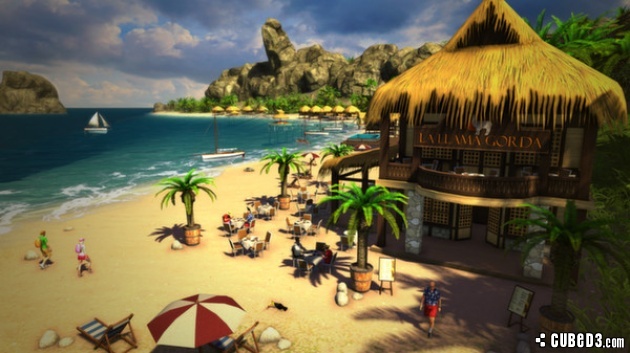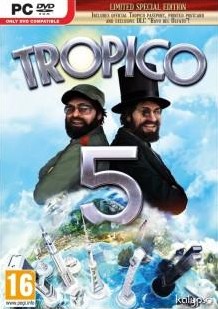Tropico 5 (PC) Review
By Jordan Hurst  28.09.2014
28.09.2014

The Tropico series has a lot going for it. The most obvious selling point is that it casts players as El Presidente, a tongue-in-cheek euphemism for "all-powerful dictator," effectively making it the Grand Theft Auto of city simulations. The series' less acknowledged highlight is that, thanks to memorable characters and lots of black comedy, it's possibly the only member of its genre that feels like it was created by actual humans, rather than a team of robots attempting to imitate society using numbers. These factors have given the series a strong fan base despite its regrettably static gameplay between instalments. Tropico 5, on the other hand, seems to be an attempt to remove the stigma of iterative sequels from the series, and it succeeds...sort of.
The big question looming over Tropico 5's head is whether or not it's worth playing for those that already own one of the previous games. The answer, surprisingly, is "yes," but that doesn't mean that all of its changes are for the better. It simply means that enough new mechanics do work to warrant a revisit to the eponymous island nation. Fortunately, the largest of these mechanics, eras, is also the best-implemented. Rather than continue the Cold War stasis of previous titles, Tropico 5 further develops what Tropico 4's Modern Times expansion started, and divides the gameplay timeline into four Civilization-style eras spanning a little over a Ccentury. Unlike in Civilization titles, however, these eras actually do something. Namely, they section off additional mechanics and options until certain milestones have been passed, easing the player into the game's nuances - a task that other games with this level of complexity consistently fail at. They also significantly broaden the scope of the game's content, and introduce shifting goals and priorities - two things that are highly appreciated in such a previously straightforward genre.

On the other hand, the game's second most advertised new feature, the dynasty system, is a waste of code. It allows players to discover relatives of El Presidente and use their special traits to assist in the dictatorship. It's a neat concept, but it feels like it was implemented by two different developers with opposite philosophies regarding how prominent it should be. This means that events involving dynasty members are extremely rare, and upgrades for them are prohibitively expensive, but fully upgraded members are severely overpowered, and dynasties are saved across all modes, letting experienced players waltz into starting scenarios and crush all opposition within minutes. Most frustratingly, the series' hallmark "Swiss bank account" feature is used exclusively for dynasty upgrades, even though Tropico 4 already figured out how to make the feature worthwhile three years ago. Dynasties were presumably created as a side effect of eras, to eliminate the strangeness of a century-old Presidente, but if that was the case, the plan was forgotten during development, as both El Presidente and his dynasty are immortal for the game's duration, and are alternately treated as individuals and as the same person.
This ambiguity regarding the connection between player and protagonist is especially pronounced in the game's campaign, in which El Presidente is an actual character (and a sympathetic one at that, completing the cognitive dissonance needed to be declared the Grand Theft Auto of anything). The narrative delivery as a whole feels very disconnected, as it mostly consists of advisors telling the player about events happening elsewhere. This makes sense during the campaign's first half, when the story is about international events to which Tropico is little more than an observer, but when Tropico and El Presidente become the focus, it becomes obvious that the narrative was squeezed in to the existing product late in development. However, the plot itself is amazingly campy, and thanks to its Cold War aesthetic, feels like a James Bond film without James Bond, instead starring political caricatures turned supervillains. The game presents everything with a wry smile; it knows how dumb it is to suggest stalling an invasion by exporting enough rum to get the foreign army drunk, but it also knows how funny it will be when it works, and that this sort of logic-defying mission is the only way anyone will ever get a decently interesting story out of this genre. It's not content to rest on the "stupid people are funny" instinct, either, as the writing is filled with satirical wit.

Next on the list of Tropico 5 features that partially fulfil their purpose, there's the multiplayer component. First off, rest assured that Tropico 5 does not repeat the sins of SimCity 2013, i.e., it doesn't needlessly attach collaborative elements to a functionally single-player experience in an attempt to disguise its DRM, and instead features a legitimate and distinct multiplayer mode. When played cooperatively, it works quite well, as practically every mechanic is enhanced by a cooperative element, and additional challenge is introduced in the form of space management. It does ultimately feel a little pointless, however, as multiplayer is only supported in sandbox mode, where the only goals are user-defined. Competitive multiplayer, on the other hand, has a definitive and satisfying objective, but its execution doesn't fit so well with the existing gameplay. In particular, military victory will almost definitely see a lot of pre-emptive banning, since it's impossible to gain new soldiers mid-battle, making even the tiniest invasion a potential instant win. Additionally, for anyone wondering how the ability to pause time and fast-forward (core game mechanics in single-player) would be altered to accommodate multiplayer; the answer is that they weren't. Both players can make these changes at will, and accordingly, both players are affected, whether they want to be or not.
To continue with the list of mechanical mixed bags, the interface is excellent - it's organised, colourful, and conveys essential information in ways that are easily absorbed, but it omits several important overlays relating to citizens' happiness. This is especially strange, because it contains other happiness-related overlays like liberty and crime safety, which are presumably calculated in similar ways. Furthermore, the ability to personally visit establishments to increase their productivity has been replaced with a new system where individual citizens can be assigned as managers, which will alter establishments' behaviour depending on the managers' personalities. It's a much more versatile and logical system, but discovering and effectively assigning managers is an incredibly slow and inconvenient process. Additionally, while the AI has been improved overall, Tropican citizens still have trouble making certain decisions, and often choose to remain homeless while living next to vacant housing they can easily afford. Finally, the game introduces a huge balance issue by making a building's productivity directly proportional to its budget, with no diminishing returns or long-term penalty. It doesn't prevent the game from being playable ideologically, but it does mean that a wealthy communist utopia with no lower class is objectively better at achieving the player's goals, which is rather problematic for anything with "simulation" in its genre name.

Despite all of its underdeveloped concepts, and despite the fact that most of the gameplay consists of ensuring some numbers balance with some other numbers, Tropico 5 is still extremely addictive, and is a fine example of why city simulators resonate with so many players. The basic reason most often cited is that directing and observing the growth of something (in this case, a destitute little colony into a byzantine metropolis) is inherently engaging. Perhaps counter-intuitively, Tropico is even more engaging thanks to its relative autonomy; watching the island's society fill in its own cracks, gradually sort itself into jobs based on education, and housing based on wealth, all in accordance with player-issued directives is oddly fascinating, like an ant farm on a much larger, more relatable scale. Also, while the aforementioned communist utopia may the most effective economic option, players will still need to balance the approval of a handful of ideological factions - a task that is literally impossible to perform perfectly, ensuring that there is still some challenge to the gameplay.
As previously noted, humanity is one of the things that makes Tropico stand out from its contemporaries. It's not surprising, then, that Tropico 5 excels at the artistic side of game development. The new art assets that have been marketed as an abnormally large deal are quite pretty, and their slightly disproportionate size goes nicely with the theme of political caricature. The soundtrack is a lovely collection of catchy Caribbean arrangements with a impressive amount of compositional variety considering its narrow instrumental and tonal scope. Finally, the game's quality dialogue is delivered with some stellar voice acting, and the sound effects are generally appropriate, if a little annoying when multiple buildings need to be selected one after another. Incidentally, the game would have benefitted from additional ways to control multiple buildings simultaneously.

Cubed3 Rating
Good
Tropico 5 will appeal to Tropico fans. That may seem like a massive cop-out, but in this case, it doesn't mean that Tropico 5 is just more Tropico 4; presumably Tropico fans are smart enough to just stick with Tropico 4 if all they want is more of it. It means that Tropico 5 breathes new life into the series, without abandoning what it used to be. The developers at Haemimont Games have taken their series apart and reassembled it in a whole new way, and while the result is riddled with flaws, it's also charming, funny, and welcoming to newcomers and veterans alike. As aimless steps away from stagnation go, that's a pretty solid one.
Comments
Comments are currently disabled

 Sign In
Sign In Game Details
Game Details
 Out now
Out now  Out now
Out now  None
None  Out now
Out now  Subscribe to this topic
Subscribe to this topic Features
Features






 Top
Top

